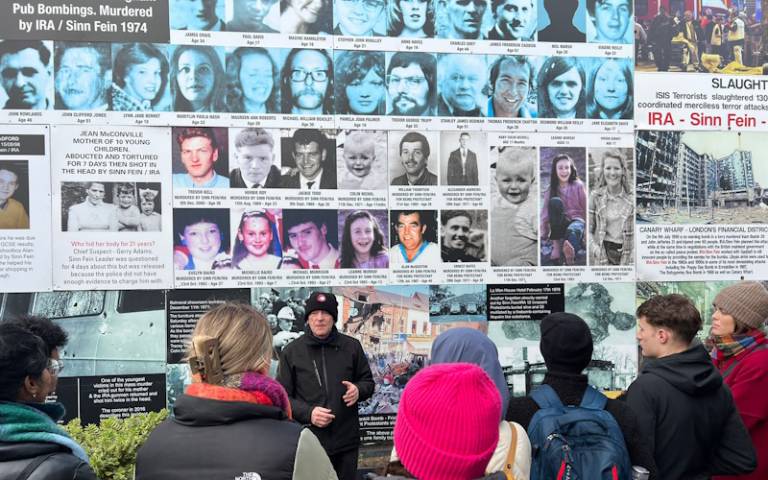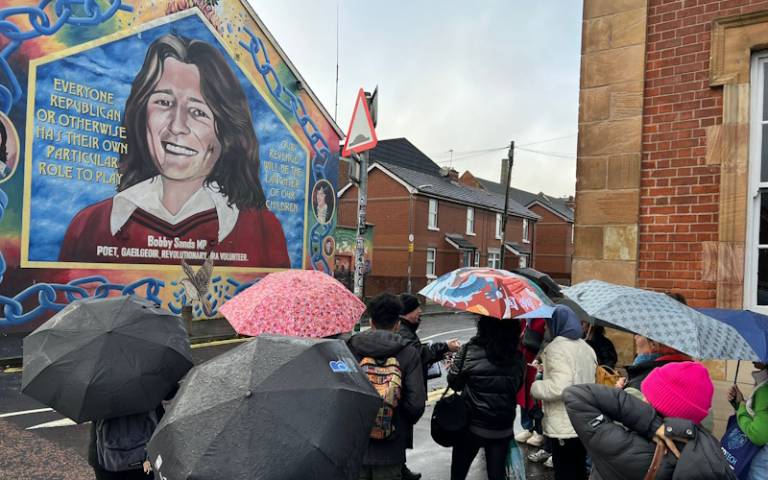Students' Union UCL's Impartial Chairs trip to NI explores perspectives on reconciliation
10 January 2024
UCL's Halle McCarthy attended Students' Union UCL's Impartial Chairs experiential learning trip to NI, alongside the cohort of student Impartial Chairs, to understand how the programme can inform and feed into our work on Disagreeing Well.

Hear from Halle about her experience and thoughts on the trip and Impartial project. Halle is part of UCL’s External Engagement team, working on the Disagreeing Well campaign.
This year, Students' Union UCL recruited 15 students across all disciplines to train as impartial chairs. The impartial chairs are trained to manage debates and chair difficult conversations across campus. As part of their training, the group spent four days in Northern Ireland meeting with different people and hearing different perspectives on reconciliation in the context of Northern Ireland.
For decades, Northern Ireland grappled with a divisive conflict known as "The Troubles." This period of sectarian violence and political unrest left deep scars across society. Today, as Northern Ireland strives for a brighter future, integrated education has emerged as a powerful tool for fostering understanding, breaking down barriers, and promoting reconciliation. The Troubles, a conflict that lasted from the late 1960s to the Good Friday Agreement in 1998, was rooted in historical and religious divisions between the Protestant unionists and Catholic nationalists. The struggle for political and cultural dominance led to violence, loss of life, and a deeply divided society. The scars of this period are still visible today, with segregated communities and a lingering sense of mistrust between different religious and cultural groups.
On our final day of the trip, a day focused on ‘lessons learned and looking forward’, we visited Lagan College. Lagan College was the first all ability, co-educational college in Belfast, established in 1981 by parents who chose to educate their children together. We were greeted by sixth form pupils and teachers from Lagan College and shown around the school. This was followed by a discussion on how they teach, what the values of the school are and how they embed integration into everything they do; first and foremost into the curriculum and notably the religious education curriculum. Lagan College teaches religious education in a neutral way, not prescribing the belief system of any one faith. They choose to honour all different beliefs in the way they teach, but not enforce a specific way of thinking. This is led by their chaplains, of which there are two, one of Protestant faith and one of Catholic faith. They lead the chaplaincy together and share the ‘commitment to be one community who learns and worships together based on the principles of equality, respect, reconciliation and service to others’. The chaplains explained how they lead in a neutral way by offering different services to mark each religions traditions, and making sure the student community feels seen and heard.
Hearing testimonies from the students was a highlight for the UCL cohort, who chatted with a group of Lagan College student leaders. The students were a bright, diverse and vibrant group who are ambassadors for the college and were happy to share their experiences openly. A number of them remarked how counterparts in non-integrated schools would not mix with peers of other groups or religions, often due to lack of opportunity to do so rather than choosing not to. The Lagan College students were quick to share that for them, early exposure to other viewpoints in their peer group was key for them developing a more understanding viewpoint. The students also expressed that integration allowed them exposure to diverse ways of thinking from a younger age, so it is normalised and they develop less bias.
Integrated education offers hope in Northern Ireland, offering a way to bridge the gaps that have historically divided communities. In an integrated school, students from diverse religious and cultural backgrounds learn together in an inclusive environment that promotes understanding, tolerance, and respect. By breaking down the walls of segregation, integrated education aims to create a generation of young people who see each other as individuals rather than representatives of a particular community.
According to Queens Policy Engagement (Queens University Belfast), in 2023 there are 70 integrated schools in Northern Ireland, comprising just 6% of schools and 7% of pupils. This suggests that this integrated approach to education can only impact a small proportion of the community, and will be able to make change but at a slow pace. Many of the students at Lagan College highlighted that they were exposed to different communities and religions from a young age, and that this is a very different experience from that of students in segregated schools. The Lagan College students stressed the positive impact that this has had on their ability to see different perspectives and be empathetic to different groups. Integrated education allows for these values and behaviours to be learned from a young age, and breaking down barriers through things like arts and sport.
From what we heard, integrated education has a critical part to play in moving the reconciliation forward across Northern Ireland, and scaling the integrated education offering would allow for more young people and their families to benefit from it. The interest for integrated education within Northern Ireland has also significantly increased; a recent study suggested that 68% of respondents to the 2022 Northern Ireland Life and Times (NILT) survey would prefer that their children attended a mixed-religion school (up from 35% in 1998). This is indicative of a hopeful future for Northern Ireland and a continued peaceful co-existence between the many different communities that live there.
In the aftermath of the Northern Ireland conflict, integrated education has emerged as a beacon of hope, offering a pathway to reconciliation and a shared future. The statistics highlight the positive impact of integrated schools on fostering cross-community relationships and building a more cohesive society. As Northern Ireland continues on its journey towards unity and understanding, investing in integrated education remains a key strategy for breaking down the barriers that have divided communities for too long. By embracing the principles of integrated education, Northern Ireland can pave the way for a brighter, more harmonious future for generations to come.
(Pictured above and below: Impartial Chairs on UCL Student Union's Impartial Project NI trip)

Source: Assessing demand for integrated education, by Dr Paula Devine, 14 Jun 2023, Queen’s Policy Engagement, Queen’s University Belfast
 Close
Close

